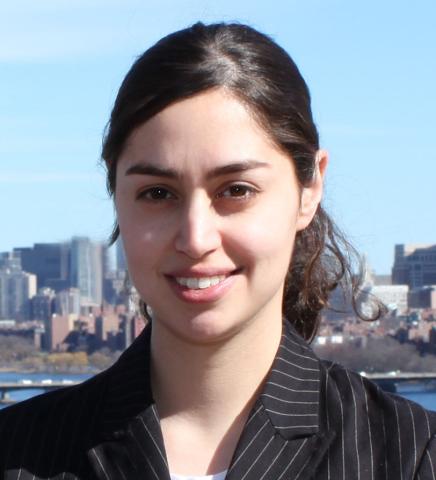event
BME Speaker Seminar with Marjan Rafat Ph.D.*
Primary tabs
*** FACULTY CANDIDATE ***
Marjan Rafat, Ph.D.*
Postdoctoral Scholar,
Stanford Imaging Radiobiology Laboratory,
Stanford University
Deconstructing the Tumor and Tissue Microenvironment
ABSTRACT
Despite aggressive surgical, radiological, and chemotherapeutic intervention, triple-negative breast cancer patients experience high rates of recurrence. The role of the microenvironment in recurrence, however, is not well understood. To address this, I developed methods for manipulating cell adhesion and cell infiltration in vitro by using biomaterials to model the microenvironmental factors that influence cancer metastasis and recurrence. Cell-cell interactions between tumor cells and the endothelium are known to facilitate metastasis. I designed photopolymerizable polyvinyl alcohol hydrogels with varying surface properties. Rather than using the common cell adhesion peptide arginine-glycine-aspartic acid (RGD), I established that conjugating two antibodies to cell adhesion molecules synergistically induced endothelial cell attachment. Mimicking cell-cell interactions resulted in stronger adhesion than could be observed with conventional adhesion molecules. In addition, because decreased pH in the tumor microenvironment has been shown to promote local cell invasion, I fabricated pH-responsive scaffolds. These scaffolds promoted cell infiltration and survival by encouraging enhanced oxygen and nutrient diffusion in acidic environments. Taken together, these techniques can be used in the design of microenvironment models.
The microenvironment can be influenced not only by endogenous factors but exogenous interventions as well. In the clinic, irradiation of the tumor bed occurs following tumor resection and chemotherapy in breast cancer treatment. To test the hypothesis that the irradiated microenvironment guides tumor and immune cell behavior, I characterized the effects of normal tissue irradiation on tumor and immune cell migration. The consequence of radiation on tumor cell recruitment to normal tissues was studied both in vitro and in vivo. Mice were inoculated with luciferase-labeled breast cancer cells orthotopically in the mammary fat pad (MFP), and the contralateral normal MFP was irradiated. I found that radiation promotes tumor cell recruitment in immunocompromised mice and that CD8+ T cells inhibit tumor cell migration to normal tissues. Tumor cell recruitment was shown to be coupled with macrophage infiltration in the absence of CD8+ T cells. This study established that the normal tissue radiation response modulates tumor and immune cell recruitment. My work suggests that the tumor stroma may facilitate tumor cell invasion and regrowth following radiotherapy in immunocompromised patients. Future studies will utilize these results to engineer improved in vitro tumor microenvironment models to probe the complex physical, chemical, and biological cues that influence cancer recurrence and metastasis.
Host: Wilbur Lam, Ph.D.
Thursday, Feb. 2
10:30 a.m.
HSRB Auditorium,
Emory University
Videoconference:
Georgia Tech: McIntire Rm 3115 and TEP 104
Status
- Workflow Status:Published
- Created By:Walter Rich
- Created:01/20/2017
- Modified By:Fletcher Moore
- Modified:04/13/2017
Categories
Keywords
Target Audience

